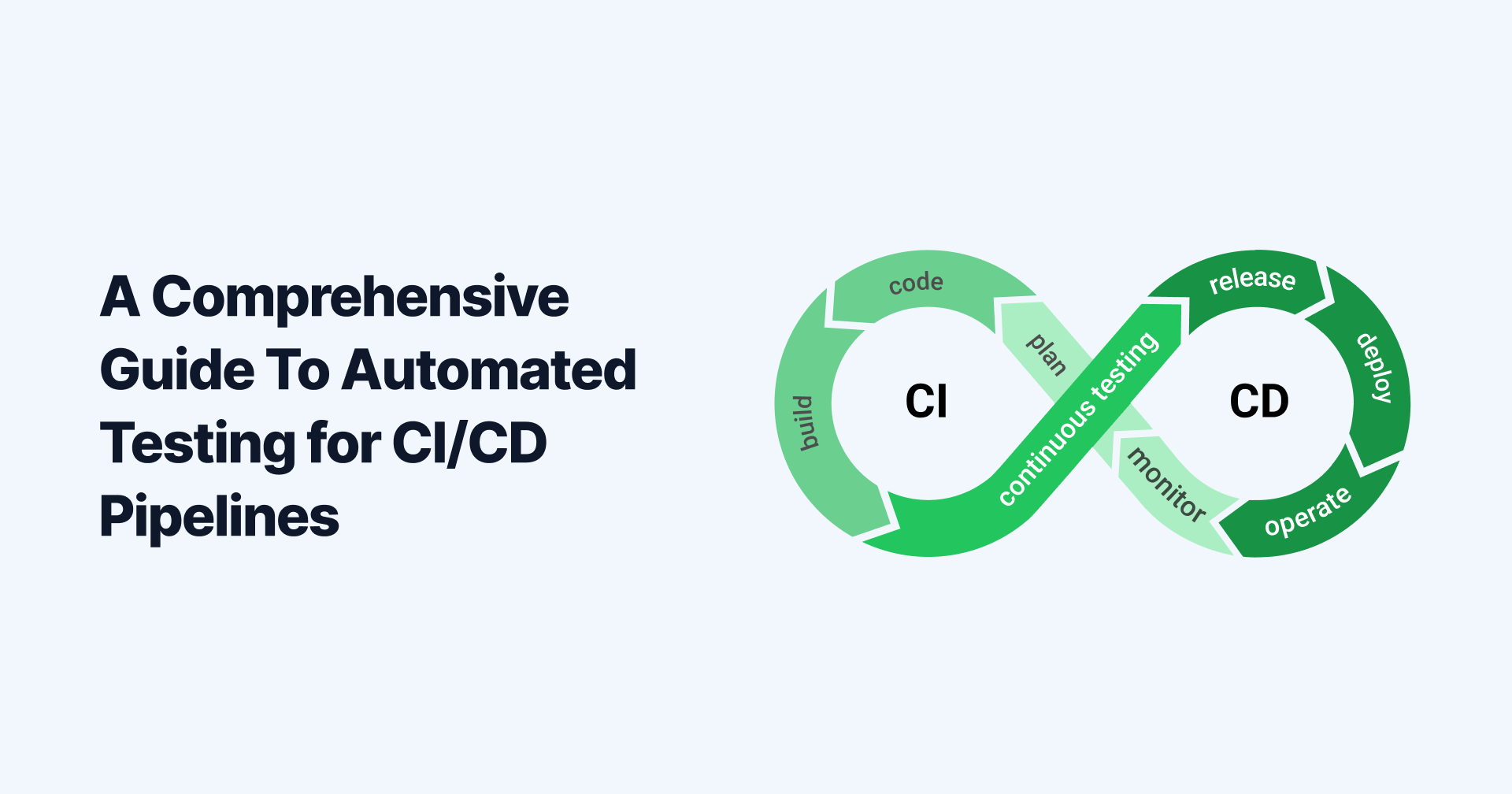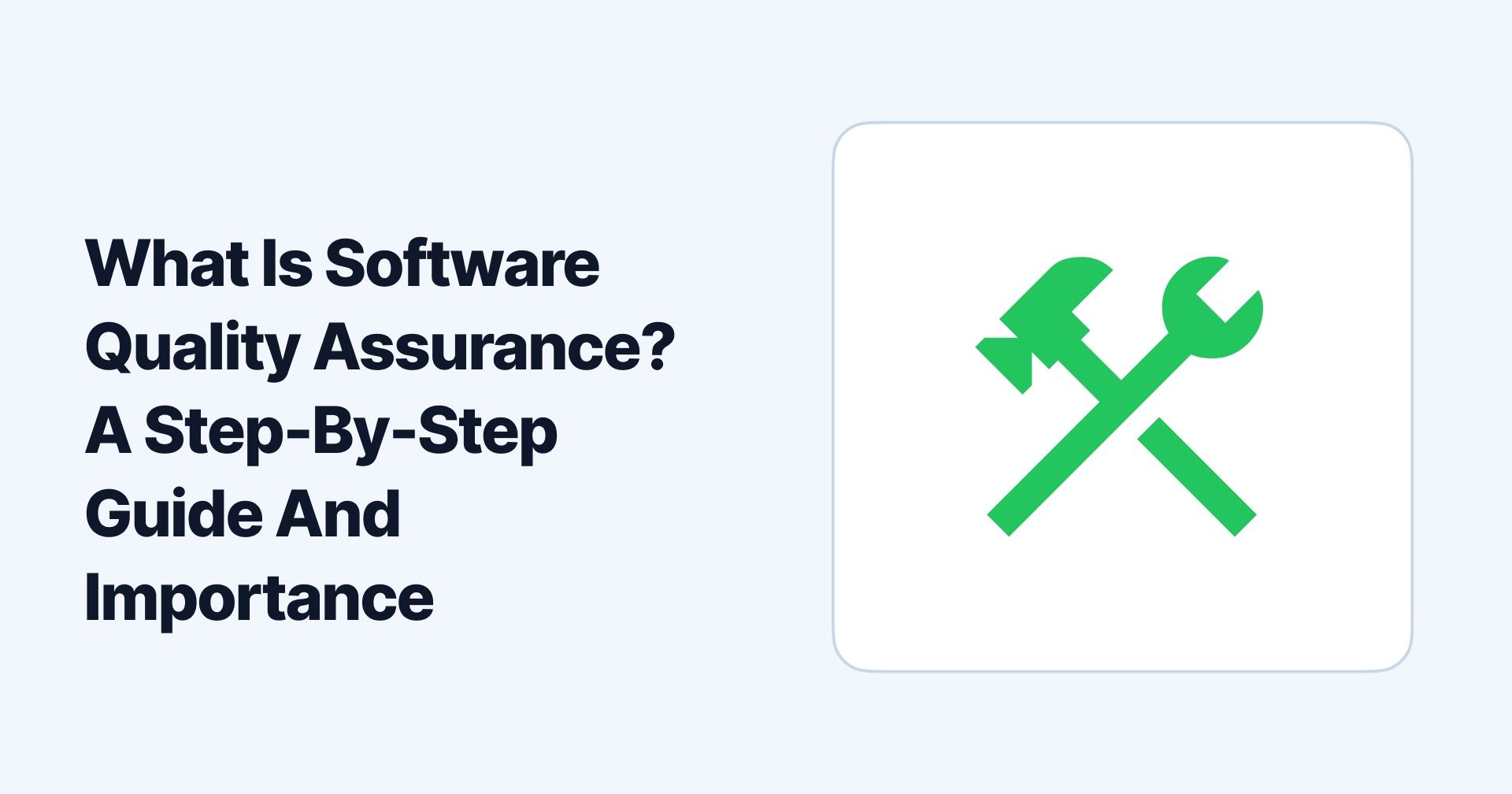The growing reliance on software solutions has pushed organizations to adopt newer methodologies in software development for the last decade. The DevOps process is a popular choice for several companies who want quality software products out in the market.
However, testing these products can sometimes be an obstacle when companies adopt traditional and outdated testing strategies. While CI/CD pipelines promise gradual meaningful changes, they require several test runs for every stage to ensure proper functioning.
Automated testing for CI/CD pipelines removes the requirement of manual intervention by automatically performing repetitive tasks without any chance of errors or oversight. Our article explains how automated testing fits into CI/CD processes.
What is a CI/CD Pipeline?

Continuous Integration/Continuous Delivery (CI/CD) is the leading methodology companies choose to drastically reduce the duration of their software development lifecycle (SDLC) and deploy faster by leveraging automation.
Organizations shifted to the DevOps process from traditional methods like the waterfall to adapt to the evolving challenges in the industry.
Developers and QA testers work closely together to test frequently in the development cycle with automation tools to implement quality features. The CI/CD promotes a constant feedback loop by testers to improve your dev team’s codes as it is written with the least amount of manual work.
With CI/CD, you can ensure high-quality software products, a faster time-to-market (TTM), and an optimal customer experience that helps drive up revenue.
Continuous Integration
Continuous integration (CI) is the first step of the CI/CD DevOps strategy, where developers working on the same project regularly merge code changes with a central control repository after testing it in their workstations.
Software companies can unify their teams under the best practices from agile and DevOps testing methodologies to collaborate on a single shared codebase. After committing code to version control, an updated repository model is built.
Unit tests are conducted to analyze the behavior of individual code units, and system tests are performed after being deployed on test environments. If the process runs into a failure, the team is notified about the results, the defects are addressed, and the process repeats.
CI is a huge step up from traditional testing methods as QA teams do not wait until the end of the SDLC to identify bugs and work alongside dev teams to define the accepted code quality and inform what can be implemented.
Continuous Delivery
Continuous delivery (CD) starts where continuous integration ends to release builds on production environments when required, allowing your teams to deploy faster and reduce the time-to-market (TTM).
Before the software is deployed for production, your teams must automate the testing process at the unit, integration, and system levels.
Why Is Automated Testing Integral to CI/CD?

Implementing test automation in your CI/CD pipelines is crucial for the following reasons:
1.Automated testing uses software tools to forego the manual intervention required by your QA teams to validate the quality of your software products.
QA teams would manually perform a checklist of tasks to verify the integrity of the codebase at the very end of the SDLC. Human intervention often falls short in these circumstances as some defects go unnoticed or checks run inconsistently.
2.Development cycles following the agile and DevOps methodologies benefit dramatically from automated testing. In the waterfall process, testing occurs at the end of the SDLC when the code has been integrated into the code repository.
Dev teams that inadvertently incorporate erroneous code cause several defects and bugs to be a part of the software product. If the code was added toward the earlier stages of the development cycle, fixing the issues could delay the launch of your product.
Automated testing enables QA and dev teams to collaborate in testing code changes early before it is committed to the central repository to prevent defects further in the production cycle.
3.Automated testing for CI/CD pipelines forms a constant feedback loop where dev teams are also put into the testing process in an agile approach with shorter coding cycles.
Test automation aims to implement new code frequently supplemented with rapid feedback from testers to ensure the gradual release of updates and that the additions do not conflict with the existing structure.
Role of Automation Testing in CI/CD Pipeline
Automated testing serves the following purpose in your CI/CD pipeline:
Enables testing to shift left: Automated testing for CI/CD pipelines is a critical component that facilitates the identification of bugs early in the development cycle, with consistent and stable integration and delivery. The bugs can be fixed before implementation to create a solid foundation for subsequent changes and additions, enabling your testing process to shift left.
Verification of code quality: You can prevent regressions and validate the functionality of newer features while running the same test scripts on CI environments to verify every build. Automated tests must be scheduled daily to harness the full potential of the CI process to make frequent and smaller updates.
Automates repetitive tasks: Automated testing tools can work with test data to conduct testing for every stage of the SDLC and free up the work undertaken by QA testers by taking care of repetitive tasks. The central objective of QA teams is to collaborate with dev teams to write automated test scripts.
Greater test scalability: In addition to carrying out repeated tasks, automated testing increases the scalability of your quality assurance efforts by running tests parallelly for shorter testing times while covering more test cases.
What Tests Should Be Automated?
When setting up a structure to visualize automated testing for CI/CD pipelines, most professionals prefer to create a testing pyramid where simple and straightforward to run tests are categorized at the bottom for a stronger foundation to eventually run complex tests.

Unit Tests
Unit testing covers individual instances of code to test the behavior of a single unit, like methods or classes. Unit tests are best used for sensitive calculations to ensure specific inputs to a function have the designated output and verify if the component works as expected.
You must invest in writing unit tests as dev teams start writing the code, as it can span the entire system. The recommended approach for unit testing is to write tests as you implement smaller new code to ensure they adhere to quality standards and do not conflict with the existing codebase.
Integration Tests
Some code units in your codebase can point toward a third-party software component. Integration tests are run to verify the behavior of multiple software parts that interact within an application system, such as the interaction between the codebase and a database.
Integration tests can be divided into narrow and broad tests. Narrow tests use test doubles for the specific software module to record the code behavior with the third-party integration. Broad tests use the actual module, component, or service.
Narrow integration tests run faster than broad tests because the former does not require the availability of the real module to conduct testing in your environment.
Performance Tests
Despite not being mentioned in the proposed testing pyramid, performance tests are important in automated testing for CI/CD processes to calculate metrics based on speed, stability, and responsiveness.
Performance tests measure your product’s upper limit and general behavior in a live environment. Examples include load testing to monitor the application behavior with increased simultaneous users, stress testing to deliberately cross the system’s expected usage, etc.
Other examples of performance tests can include page load timings, time to first render, and search results response time, among others.
End-to-End Tests
End-to-end tests, also called full-stack tests, sit at the apex of the pyramid because they are testing processes that take the most time to complete. These tests are concerned with the user-level experience to guarantee a bug-free and consistent customer experience.
End-to-end tests are carried out through GUIs and API calls. However, these tests are relatively more brittle and can break with the slightest changes to the user interface. Covering the smaller tests in the testing pyramid earlier can help you understand what has been covered before these tests.
With the growing complexities of test cases, as you move up the pyramid, it can get difficult to maintain complete visibility of your testing efforts while acquiring transparency for success rates, flakiness, failures, etc.
Your teams require accurate data for your test cases to ensure better testing procedures and a holistic understanding of their software development efforts in creating high-quality code for your product.
Allure TestOps simplifies the test management process in manual and automated testing for CI/CD pipelines with effective collaboration and detailed insights.
Allure Testops: The Ultimate Test Management Tool

Allure Testops is a powerful open-source test management tool that unifies your QA and dev teams to streamline your organization's manual and automatic test processes with enhanced test case documentation, extensive native integrations, and comprehensive analytics features.
Native Integrations for Optimized Testing Processes
The Allure Testops suite of integrations enables you to harness the true potential of automated testing for CI/CD pipelines by completely controlling the testing processes on a centralized platform.
We host native integrations for every CI environment, including Azure DevOps, Jenkins, Bamboo, GitLab, GitHub, CircleCI, TeamCity, etc. with job sync, pipeline starting and listing capabilities, and much more.
Click here to review the list of integrations for other CI systems, issue trackers, and third party TMS available on Allure Testops.
Smart Test Cases

Allure Testops’s Smart Test Cases feature automatically updates your test case repository with results after every run to improve the data your teams work with without manual intervention.
Your DevOps teams can run test cycles for a constant feedback loop. At the same time, our service generates documentation based on results from successful runs to maintain a single source of truth by storing test intent on a centralized platform.
Furthermore, using an intuitive UI, you can fine-tune your version control with the Test Cases as Code feature. QA and dev teams can access a central hub for insights to streamline test coverage and write efficient scripts for automated testing for CI/CD processes.
Granular Control Over Test Cycles

Allure Testops build servers let you pause, resume, and rerun build jobs effortlessly. We automate the identification and classification of defects into predefined issue trackers to further bypass the need for manual effort.
Our dashboard widget lets you create targets, review product status, and monitor the testing process closely. Performance metrics can be viewed at a glance using comprehensive visualizations to provide data through a single pane of glass.
Allure Query Language offers greater customizability with the option to create personalized KPIs for enhanced project tracking.
An Open-Source Simplified Version - Allure Report

Allure Report is a flexible multi-language test report platform backed by the community. You can create striking visualizations to show accurate data for your test cases without navigating multiple interfaces.
We also offer integrations for programming languages and testing frameworks like Java (JUnit, TestNG), Python (PyTest, Nose), JavaScript (Jasmine, Mocha), .NET, Cucumber, Go, and PHP that promise full functionality right out of the box.
You can gather detailed insights for particular test cases by drilling down reports to achieve complete transparency on metrics like success rates, flakiness, and other metrics classified by features, stories, and categories, and is viewed on a tree-based representation.
Pricing
Allure Testops offers two premium plans, Allure Testops Server and Allure Testops Cloud, based on your company’s technical expertise and business requirements.
Allure Testops Server offers flexibility in your CI processes, where you can maintain your test instances after the seamless integration of our services into your pipelines. The plan comes with a 30-day free trial to try our features risk-free.
| Allure Testops for 1 - 50 users | $30/month or $27/month (annual) |
|---|---|
| Next 51 - 100 users | $20/month or $18/month (annual) |
| Next 101 - 250 users | $10/month or $9/month (annual) |
| Others | $5/month or $4.5/month (annual) |
Allure Testops Cloud is our cloud platform where we host and maintain your Testops instances for companies with limited IT capabilities. You can try our cloud features with a 14-day free trial.
| Allure TestOps Cloud for 1 – 30 Users | $39/month or $35/month (annual) |
|---|---|
| Next 31 – 50 Users | $36/month or $32/month (annual) |
| Next 51 – 100 Users | $34/month or $30/month (annual) |
| Others | $30/month or $27/month (annual) |
Conclusion
Testing is an integral process of the software development life cycle that validates the code quality being added into the central repository before it is implemented to reduce the possibility of future defects and provide a consistent end-user experience.
Automated testing for CI/CD pipelines is an irreplaceable component that reduces the delivery time while adding smaller but meaningful updates to your product. Your teams can work with a constant feedback loop and reduce your product’s time-to-market (TTM).
Allure Testops grants you superior test management capabilities where you can work with a constantly updated database and use powerful analytics capabilities to view performance metrics for data-driven decisions.
Integrate our services to your workflow with Allure Testops Server with a 30-day free trial so you can try our features risk-free or get our assistance on maintaining instances on our cloud platform by subscribing to Allure Testops Cloud with a 14-day risk-free trial.
Optimize your test processes with automated test documentation and native integrations to CI tools with Allure Testops today!



